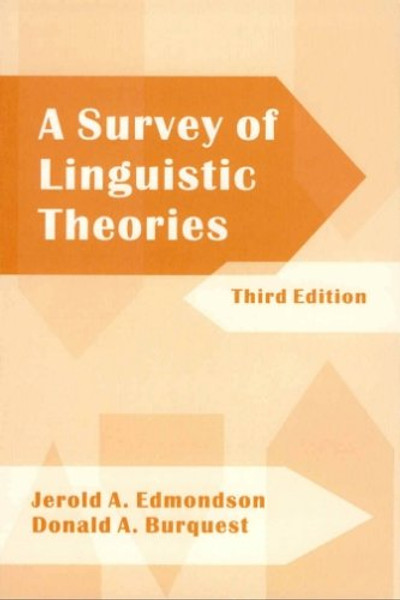Product Overview
This book is designed as a textbook and is intended to present a sample of the more popular approaches to linguistic theorizing.
It covers different aspects of each theory including general ontology, methodology, world view, and certain specifics including its problem-solving capacity regarding the English auxiliary complex. It gives a brief summary of the salient points of each theory and concludes with a brief treatment of concurrent developments in phonology. Included are discussions on
- tagmemics
- generative transformational grammar
- stratificational linguistics
- Montague grammar
- generalized phrase structure grammar
- lexical-functional grammar
- relational grammar, and
- functional approaches to grammar.
Table of Contents
Abbreviations and Symbols
Preface
Preface to the Third Edition
- Linguistic Theorizing
- The Aspects Model
- Tagmemic
- Stratificational Linguisti
- The Great GTG Schism
- Lexical-Functional Grammar
- Montague Grammar and Generalized Phrase Structure Grammar
- Relational Grammar
- Functional Models of Grammar
1.1 Of surveys and theories
1.2 Scientific progress and the logic of research
1.3 A brief history of the axiomatization of mathematics
1.4 Chomsky's definition of a grammar
1.5 Linguistics: A natural science, a social science, or a human science?
1.6 Verbal and nonverbal behavior, a unity?
1.7 Formal versus functional models
2.1 Worldview
2.2 Ontological primitives
2.3 Methodology
2.4 The specific assumptions of the Aspects model
2.5 The problem-solving capacity of GTG
2.6 The AFFIX-HOPPING transformation
2.7 The D -SUPPORT transformation
2.8 Generative transformational theorizing
3.1 Introduction
3.2 General ontology, methodology, and worldview
3.3 The specific assumptions of the tagmemic model in Pike and Pike (1982)
3.4 The specific assumptions of the tagmemic model of Longacre (1983)
3.5 The problem-solving capacity of Tagmemics
3.6 New developments
3.7 Tagmemic theorizing
4.1 Introduction
4.2 General ontology, methodology, and worldview
4.3 The specific assumptions of Lamb's Outline model (1966)
4.4 Fleming's Communcation Analysis (1988 and 1990)
4.5 The problem-solving capacity of stratificational grammar
4.6 Stratificational theorizing
5.1 Introduction
5.2 General ontology, methodology, and worldview (EST, REST, P&P)
5.3 General ontology, methodology, and worldview of generative semantics
5.4 Specific developments in EST, REST, and P&P after 1970
6.1 Introduction
6.2 General ontology, methodology, and worldview of LFG
6.3 The problem-solving capacity of LFG
6.4 LFG Theorizing
7.1 General ontology, methodology, and worldview
7.2 Specific assumptions and problem-solving capacity of Montague Grammar
7.3 Generalized phrase structure grammar
7.4 Conjunction
7.5 Dominance/linear precedence and language typologies
7.6 GPSG theorizing
8.1 Introduction to Relational Grammar (RG)
8.2 General ontology, methodology, and worldview
8.3 Problem solving in RG
8.4 Mapping theory
8.5 Relational grammar theorizing
9.1 Introduction
9.2 Functional Typological Grammar
9.3 Emergent Grammar
9.4 The formative role of language in the social context
9.5 The formative role of the sign user in language
9.6 Functionalist theorizing
References
Index







